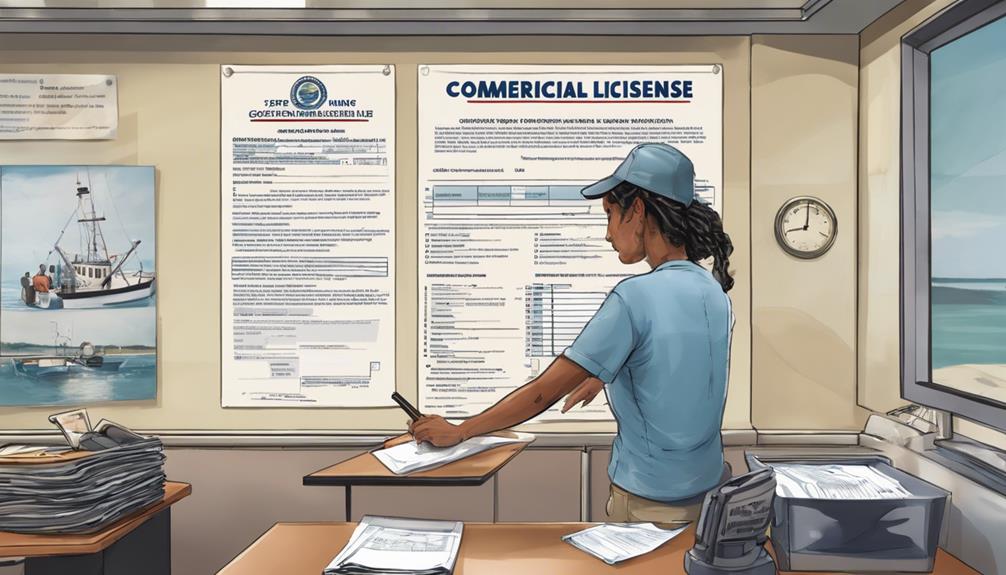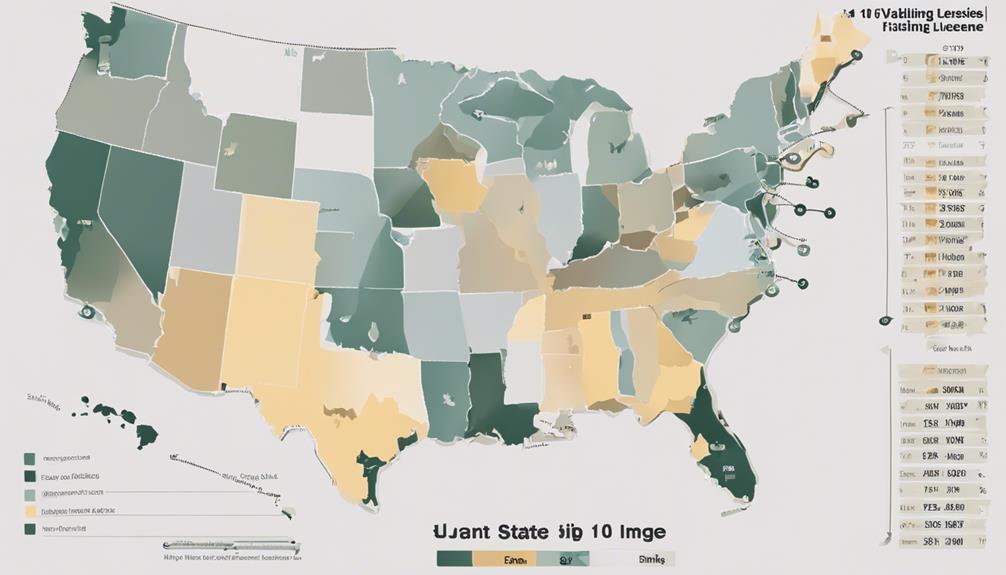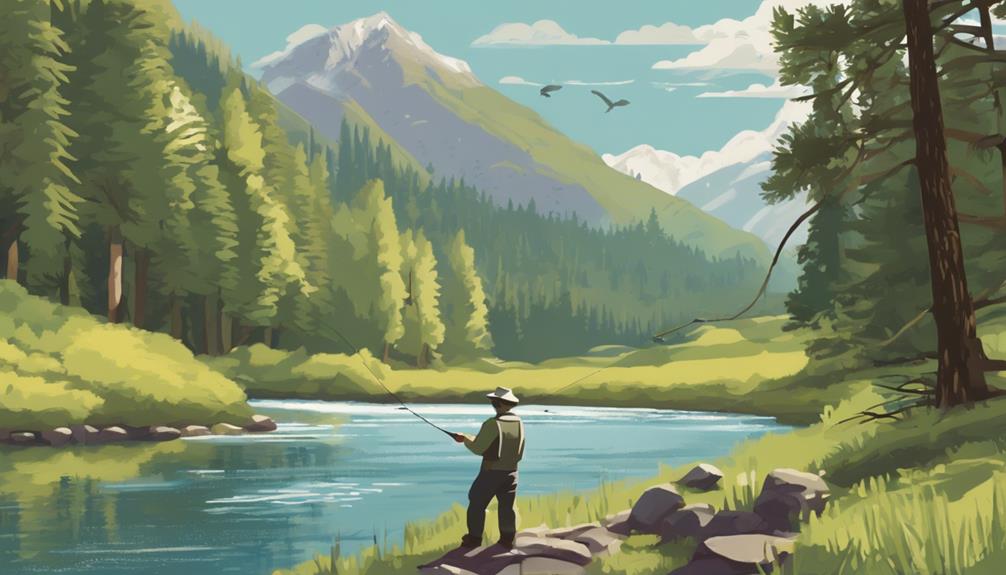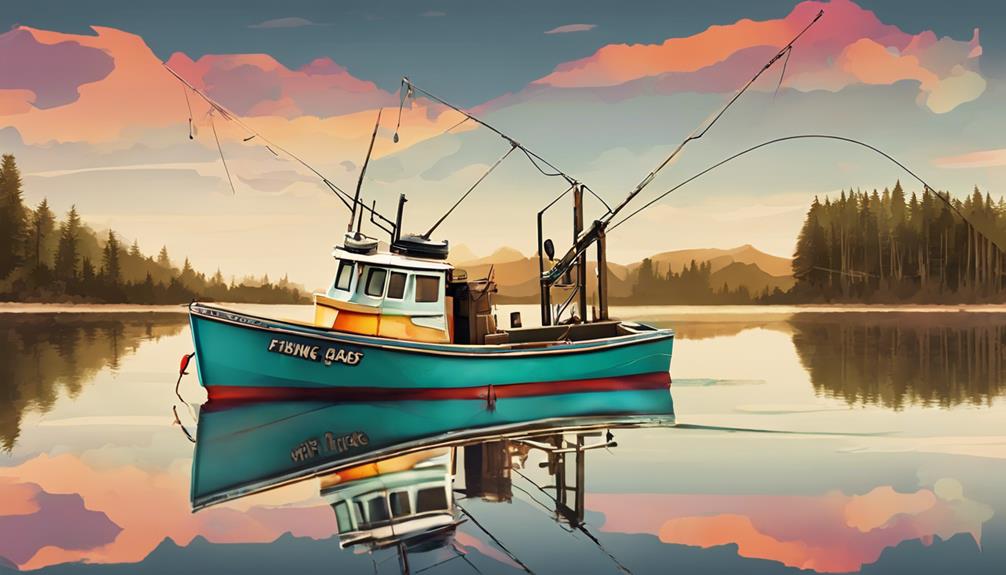Navigating the waters of commercial fishing can be both challenging and rewarding.
Before you set sail on this new venture, ensure you understand the intricate process of obtaining your commercial fishing license.
From meeting eligibility criteria to submitting the required documentation, each step plays a crucial role in your journey.
Stay tuned to discover the essential details that will set you on the path to a successful fishing career.
Eligibility Criteria
To obtain your commercial fishing license, you must meet specific eligibility criteria. The eligibility requirements typically include age restrictions, completion of a certified training course on fishing regulations and safety practices, and passing a written exam to demonstrate your knowledge of fishing laws and conservation measures. Additionally, you may need to provide proof of residency in the state where you intend to fish commercially and have a clean criminal record to ensure compliance with licensing regulations.
Application guidelines for obtaining your commercial fishing license usually involve submitting a completed application form along with the required documentation, such as proof of training course completion, identification documents, and any relevant permits or certifications. It's essential to carefully review all the instructions provided in the application to avoid any delays in the processing of your license.
Before applying, make sure to familiarize yourself with the specific eligibility requirements and application guidelines outlined by the licensing authority in your state. By ensuring that you meet all the necessary criteria and submit a complete application, you can expedite the process of obtaining your commercial fishing license. Remember to keep copies of all your documents for your records and adhere to any additional regulations or restrictions that may apply to commercial fishing activities in your area.
Application Process
To successfully navigate the application process for your commercial fishing license, ensure you have gathered all necessary documentation and familiarized yourself with the specific requirements outlined by the licensing authority in your state.
When applying, consider the following:
- Online Submission: Many states offer the convenience of submitting your application online. This can save time and streamline the process, allowing you to complete the necessary steps from the comfort of your home.
- In Person Appointment: In some cases, an in-person appointment may be required as part of the application process. Make sure to schedule any necessary appointments well in advance to avoid delays.
- Expedited Processing, Potential Delays: While some states offer expedited processing for an additional fee, there may still be potential delays in receiving your commercial fishing license. It's essential to plan ahead and submit your application with ample time before you intend to start fishing commercially.
Required Documentation
Make sure you have all the necessary documentation ready for your commercial fishing license application. To qualify for a commercial fishing license, you'll need to provide proof of residence and age. This typically involves submitting a valid driver's license or state-issued ID card. Additionally, be prepared to present documents such as a passport or birth certificate to verify your age.
In some cases, you may also be required to obtain medical clearance before being granted a commercial fishing license. This can involve undergoing a physical examination to ensure that you're fit to engage in the demands of commercial fishing. The specifics of the medical clearance process may vary depending on your location and the regulations set forth by the licensing authority.
Furthermore, a background check is often a mandatory part of the application process for a commercial fishing license. This is done to ensure that applicants don't have any disqualifying criminal offenses on their record. Be prepared to provide personal information for the background check, which may include details such as your social security number and past addresses.
Training and Certifications
Consider completing a specialized training program and obtaining relevant certifications to enhance your skills and qualifications for obtaining a commercial fishing license. These additional steps can't only improve your knowledge but also demonstrate your commitment to the industry.
- Certification Requirements: Different regions may have specific certification requirements for commercial fishing licenses. Check with your local authorities or fisheries department to understand what certifications are necessary for your area. These certifications could include training on safety protocols, environmental regulations, and specific fishing techniques.
- Training Programs: Enrolling in training programs related to commercial fishing can provide you with valuable insights and hands-on experience. Look for programs that cover topics such as navigation, handling equipment, fish identification, and sustainable fishing practices. These programs can help you gain the necessary skills to operate a commercial fishing vessel effectively.
- Industry-Specific Certifications: Some certifications, like first aid training or boating safety courses, may be universally required or highly recommended in the commercial fishing industry. Investing time and effort into obtaining these certifications can't only make you a safer and more competent fisherman but also increase your chances of successfully obtaining a commercial fishing license.
Fee Structure
Understanding the fees associated with obtaining a commercial fishing license is crucial for planning your financial investment in this endeavor. The fee structure for a commercial fishing license can vary depending on the location and type of fishing you plan to engage in. It's essential to research the specific requirements in your area to determine the exact costs involved.
Fee exemptions may be available for certain groups, such as veterans or individuals with disabilities. If you fall into one of these categories, you may be eligible for a fee waiver or a reduced fee. It's important to inquire about these options when applying for your commercial fishing license.
Payment options for your commercial fishing license typically include various methods such as credit card, check, or online payment. Some regions may also offer installment plans to help distribute the cost over time.
If the fees associated with obtaining a commercial fishing license pose a financial burden, consider exploring financial assistance programs. These programs may provide grants or loans to help cover the costs of licensing and permits. Contact your local fisheries department or relevant government agencies to inquire about potential financial assistance opportunities. By understanding the fee structure and exploring available options, you can navigate the financial aspects of obtaining your commercial fishing license more effectively.
Renewal Procedures
Navigating the renewal process for your commercial fishing license requires timely action and adherence to specific guidelines set by regulatory authorities. To ensure a smooth renewal process, consider the following key points:
- Renewal Reminders: Keeping track of your license expiration date is crucial. Many regulatory bodies send out renewal reminders via email or traditional mail. Make sure to update your contact information with the relevant authorities to receive these reminders in a timely manner.
- Procedures: Familiarize yourself with the renewal procedures outlined by the regulatory agency overseeing commercial fishing licenses in your area. This may include submitting specific forms, providing documentation of compliance with regulations, and paying any necessary fees.
- Online vs. In-Person Renewal Options: Evaluate whether online or in-person renewal is more convenient for you. Online renewal options are often available and can streamline the process, allowing you to submit documentation and payments electronically. In contrast, some prefer in-person renewals for a more personalized experience or if online options are limited.
Compliance With Regulations
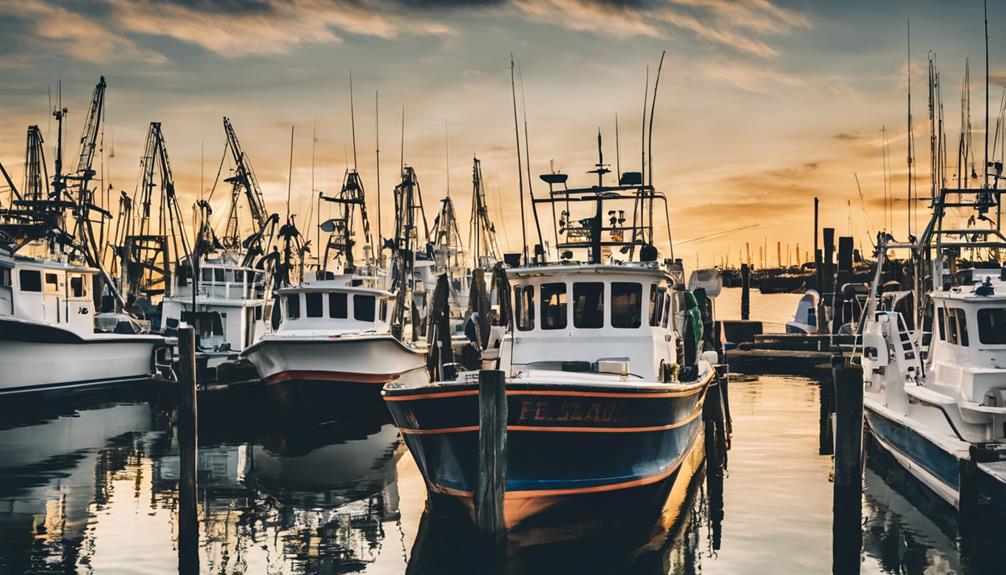
To ensure your commercial fishing activities remain in compliance with regulations, regularly review and adhere to the guidelines set forth by the regulatory agency governing your license. Staying informed about regulatory updates is crucial to avoid any violations that could result in penalties or even the suspension of your commercial fishing license. These updates may include changes in catch limits, fishing seasons, gear restrictions, or reporting requirements. By staying up to date on these changes, you demonstrate your commitment to operating within the legal framework set by the regulatory agency.
Enforcement measures are in place to ensure that all commercial fishermen are abiding by the regulations. These measures can include on-site inspections, electronic monitoring, and the review of logbooks and landing reports. It's essential to cooperate with enforcement officials and provide accurate information to avoid any issues that could jeopardize your license.
To maintain compliance with regulations, consider attending workshops or training sessions offered by the regulatory agency. These can help you better understand the requirements and stay updated on any changes. Additionally, establish a system for record-keeping to ensure that you have all necessary documentation in case of an inspection. By proactively adhering to regulations and staying informed, you can operate your commercial fishing activities smoothly and within the bounds of the law.
Additional Considerations
Consider potential environmental impacts on marine ecosystems when planning your commercial fishing activities. Being mindful of the delicate balance of marine life is crucial for the sustainability of your fishing business. Here are some additional considerations to keep in mind:
- Catch Limits: Adhering to catch limits set by regulatory bodies is essential to prevent overfishing and ensure the long-term health of fish populations. By staying within these limits, you can contribute to maintaining a healthy marine ecosystem and secure the future of your commercial fishing operations.
- Safety Regulations: Prioritizing safety regulations not only protects you and your crew but also helps in preventing accidents that could harm marine life or damage the environment. Ensuring that your vessel is equipped with the necessary safety gear, following proper procedures, and staying informed about changing weather conditions can significantly reduce risks and promote responsible fishing practices.
- Environmental Impact Assessment: Conducting an environmental impact assessment before starting your commercial fishing activities can help you identify potential risks to marine ecosystems. By understanding the environmental consequences of your operations, you can implement measures to minimize negative impacts and operate in a sustainable manner.
Frequently Asked Questions
Can I Transfer My Commercial Fishing License to Another Individual or Business?
Yes, you can transfer your commercial fishing license to another individual or business.
License ownership allows for this transferability, enabling you to pass on your license rights.
This process is crucial for business succession planning and ensuring that the license remains valid when transitioning to a new owner.
Make sure to follow the appropriate procedures and regulations to successfully transfer the license.
Are There Any Restrictions on the Types of Gear or Methods I Can Use With a Commercial Fishing License?
When using a commercial fishing license, there are restrictions on the types of gear and methods you can utilize. Gear restrictions ensure sustainable fishing practices, while method restrictions aim to protect marine ecosystems. It's important to adhere to these guidelines to promote responsible fishing.
Make sure you're familiar with the specific regulations in your area to avoid any violations and help preserve the aquatic environment for future generations.
How Often Are Commercial Fishing License Regulations Updated, and How Will I Be Notified of Any Changes?
Regulatory compliance and enforcement are crucial in commercial fishing. Industry communication and updates help you stay informed about any changes in license regulations. These rules are updated periodically to ensure the safety and sustainability of fisheries.
Notifications about changes are typically sent through official channels like emails or newsletters. Staying informed is key to maintaining your commercial fishing license and adhering to the latest guidelines.
Are There Any Specific Quotas or Limits on the Amount of Fish or Seafood I Can Catch With a Commercial Fishing License?
When fishing with a commercial license, catch limits are in place to protect the marine environment. Monitoring ensures compliance with these limits. Enforcement agencies strictly enforce regulations, imposing penalties for exceeding quotas.
Stay informed about these restrictions to ensure sustainable fishing practices. Be mindful of your catch limits to avoid facing penalties for overfishing and help preserve marine resources for future generations.
Can I Sell My Catch Directly to Consumers or Restaurants With a Commercial Fishing License, or Are There Specific Distribution Channels I Must Follow?
You can sell your catch directly to consumers or restaurants with a commercial fishing license. However, there are specific regulations and restrictions you must follow when marketing and distributing your products.
It's important to understand the guidelines and requirements in place to ensure compliance with laws regarding the selling of seafood. Be sure to familiarize yourself with the regulations to avoid any issues when distributing your catch.
Conclusion
Now that you know the steps to obtain your commercial fishing license, you can start the process with confidence.
Remember to meet the eligibility criteria, submit the required documentation, and complete any necessary training.
Stay informed about regulations and renew your license on time to continue operating legally.
With dedication and compliance, you can embark on a successful career in commercial fishing. Good luck on your journey!
